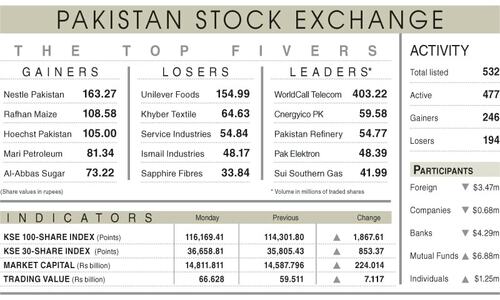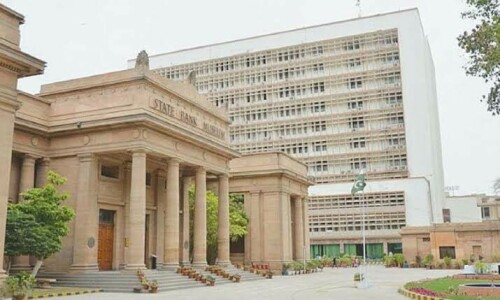 WHILE the international financial system that oiled the wheels of the world economy is in shambles, protectionism is being reinforced in the West to fight deepening recession. With credit drying up in developed economies, banks in Britain have been advised not to lend money to overseas clients.
WHILE the international financial system that oiled the wheels of the world economy is in shambles, protectionism is being reinforced in the West to fight deepening recession. With credit drying up in developed economies, banks in Britain have been advised not to lend money to overseas clients.
Focus has shifted from globalisation to national fiscal stimulus plans even in the European Union. Foreign trade is shrinking, as imports are falling on dwindling domestic demand in the United States and Europe. The industrialised world has ceased to be an engine of growth for developing countries dependent on the affluent markets for their exports. China will be a big loser.
Global foreign investments have plummeted and portfolio investments substantially withdrawn by global investors from developing economies. And multinational assistance is being used to shore up the distressed economies. China says, the best way it can help the world, is to salvage its own economy from recession. Efforts have been mounted worldwide to restore robust health to national economies, before the globalisation journey is resumed with renewed vigour and diverse approaches. For sometime, there will apause in globalisation.
The current downturn in globalisation is evident in declining foreign investments and the latest move by the United States to insert a “Buy American” clause in its stimulus programme. Earlier, the US and EU resisted investments by National Wealth Funds in their crisis –ridden corporations. For too long, the West has refused to withdraw subsidy on its agricultural products. Western countries have free market within national or regional (EU) boundaries but restrict foreign investment and trade in a variety of ways.
In the past three decades or more, globalisation was spurred by the international financial markets dominated by the West – a patronised and partially unregulated system which has almost collapsed. Unless a new international financial architecture is developed on a more equitable basis and much broader shared responsibilities, international trade and investment flows would remain stifled.
No longer can the West accumulate world’s financial resources at its financial centres like London and New York and distribute it to the developing countries according to its whims and narrow interests.
The global financial system evolved since the 1970s, anchored on the excessive printing of dollars, cannot be salvaged. The system has been destroyed by organic failures and the greed of its own creators. But what is worse, powerful dogmatists are still pinning hopes on outdated ideas which may prolong the world’s agony. The future, however, belongs to those who adjust quickly to fast changing global economic scenario.
Given the changing international environment, Pakistan needs to lookinwards rather than outwards for the resolution of its economic problems. The outlook for exports and foreign investment are not very bright, at least for short to medium -term.
With huge stimulus plans, governments of developed countries would not have much money to spare for developing countries. Multilateral assistance would depend on the domestic economic performance and the ability to repay debts. The inflow of foreign investment may improve, though not much, if the economic growth rate picks up. Like many other countries, Pakistan will have to fend for itself by adopting a policy of national self-reliance.
The opening of the domestic market to international competition (where it helps the economy and restricting trade where it hurts) has to be a gradual process. It should not be driven by donors/lenders but flow from a well conceived process of national decision-making, to avoid frequent economic downturns..
Even ideas offered by lenders that have universal application have to be adapted (not adopted) over a period of time, with well thought out sequence, and these should not to be adopted prematurely.. The devil lies in the details--- the specifics rooted in the ground realities. Countries with different backgrounds can pursue different, quite often contradictory approaches, to reach the same goal. The boom-bust business cycle cannot be over come by acquiring domestic ownership of lenders-dictated programmes nor can a dogmatic approach.
In recent years, the country benefited from huge foreign capital and financial inflows but much of it was not used to raise productive capacity. Foreign direct investment came in few sectors, primarily attracted by distress sales of state enterprises whose proceeds were needed to shore up the fiscal deficit and balance of payments position. FDI went into existing import-substitution capacities and not export-oriented industrialisation. The services sector expanded at the cost of agriculture and industry.
Pakistan’s economy is much too small , compared to those of its giant neighbours, India and China and the domestic market is shrinking because of the rising poverty. The purchasing power of the middle classes that attracts foreign investment is declining. Nor does it exhibit dynamism that successful small economies have demonstrated. The national economy is not integrated with regional markets that could attract foreign investment in projects that could cater regional markets.
Foreigners see as to how the domestic industry is performing before putting money in any market. Even local people with money find it difficult to find productive channels. There is over-reliance on financial mode to correct imbalances and develop the economy while domestic banks prefer to invest in T/bills rather than lend money to the commodity producing sectors. .
When trade deficits became unmanageable, the rupee was allowed to depreciate significantly to curb imports, with no other incentive orprogramme for import substitution, barring some focus on farm production.
The policy makers pin their hopes on services sector and agriculture for current year’s GDP growth. Manufacturing is sliding at a rapid pace It is not an integrated approach to economic development. The recent inter-sectoral disharmony gave rise to energy shortage.
The first priority should go to achieving self-sufficiency in foods grains while boosting production in farm and factories with the financial sector playing a supporting role.













































Dear visitor, the comments section is undergoing an overhaul and will return soon.